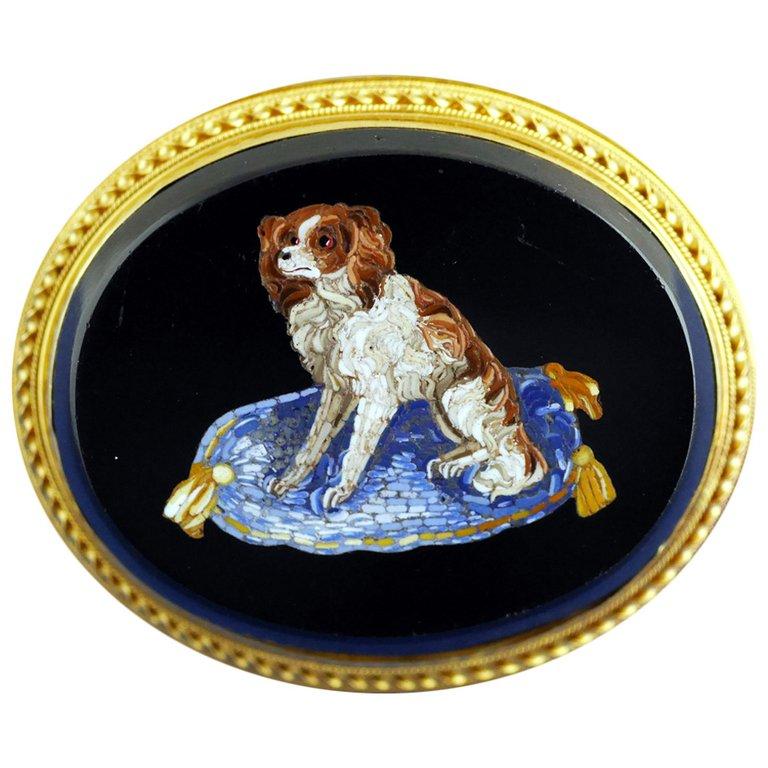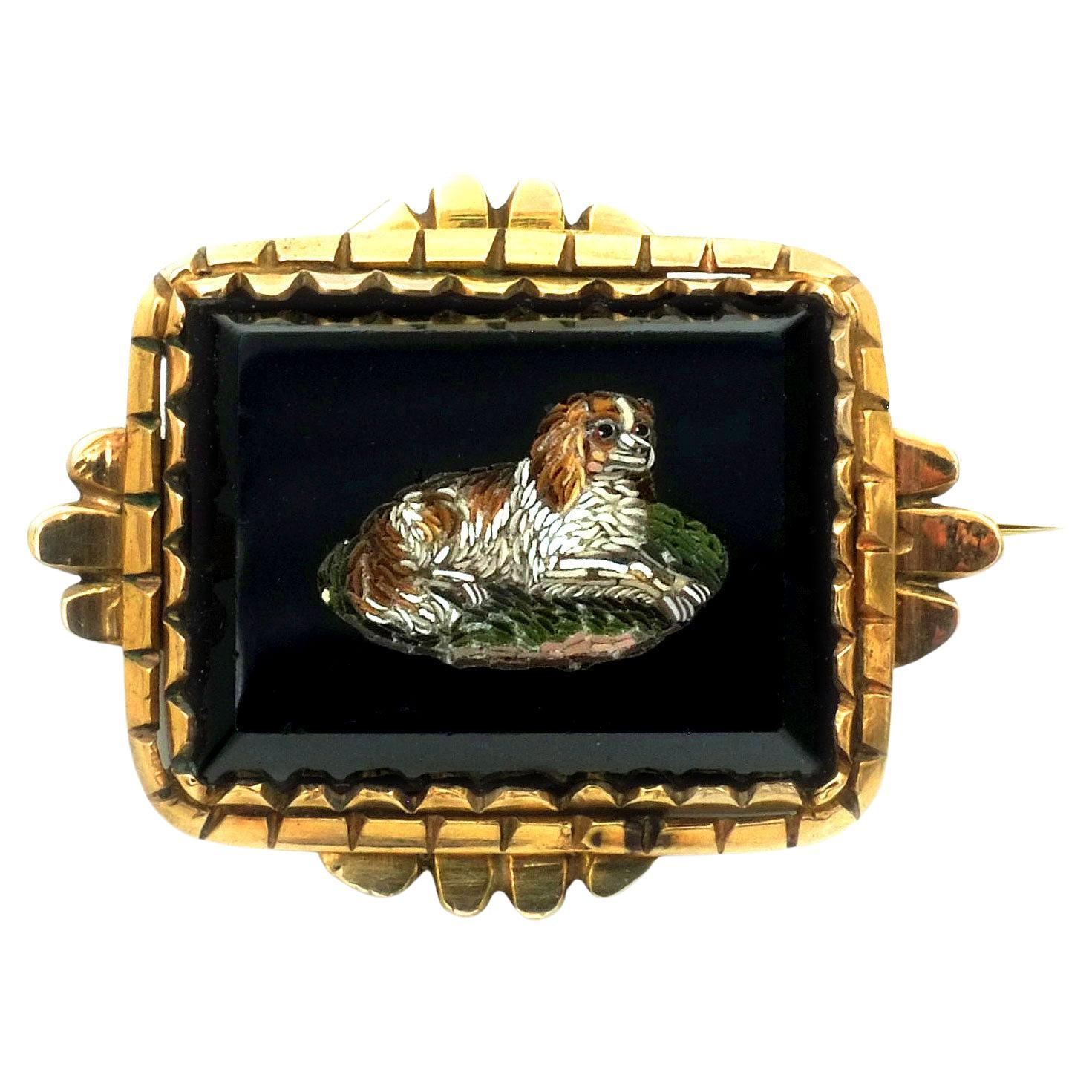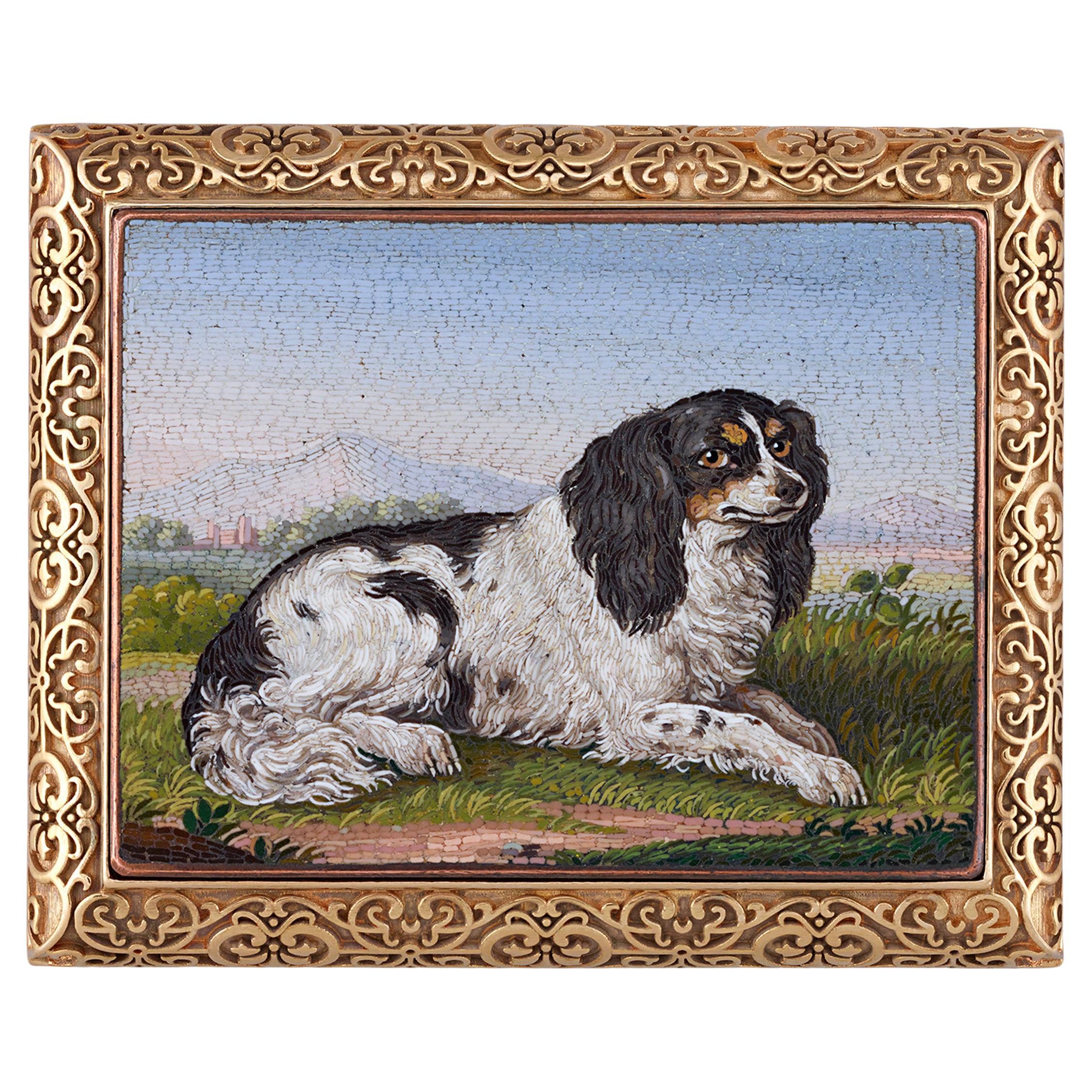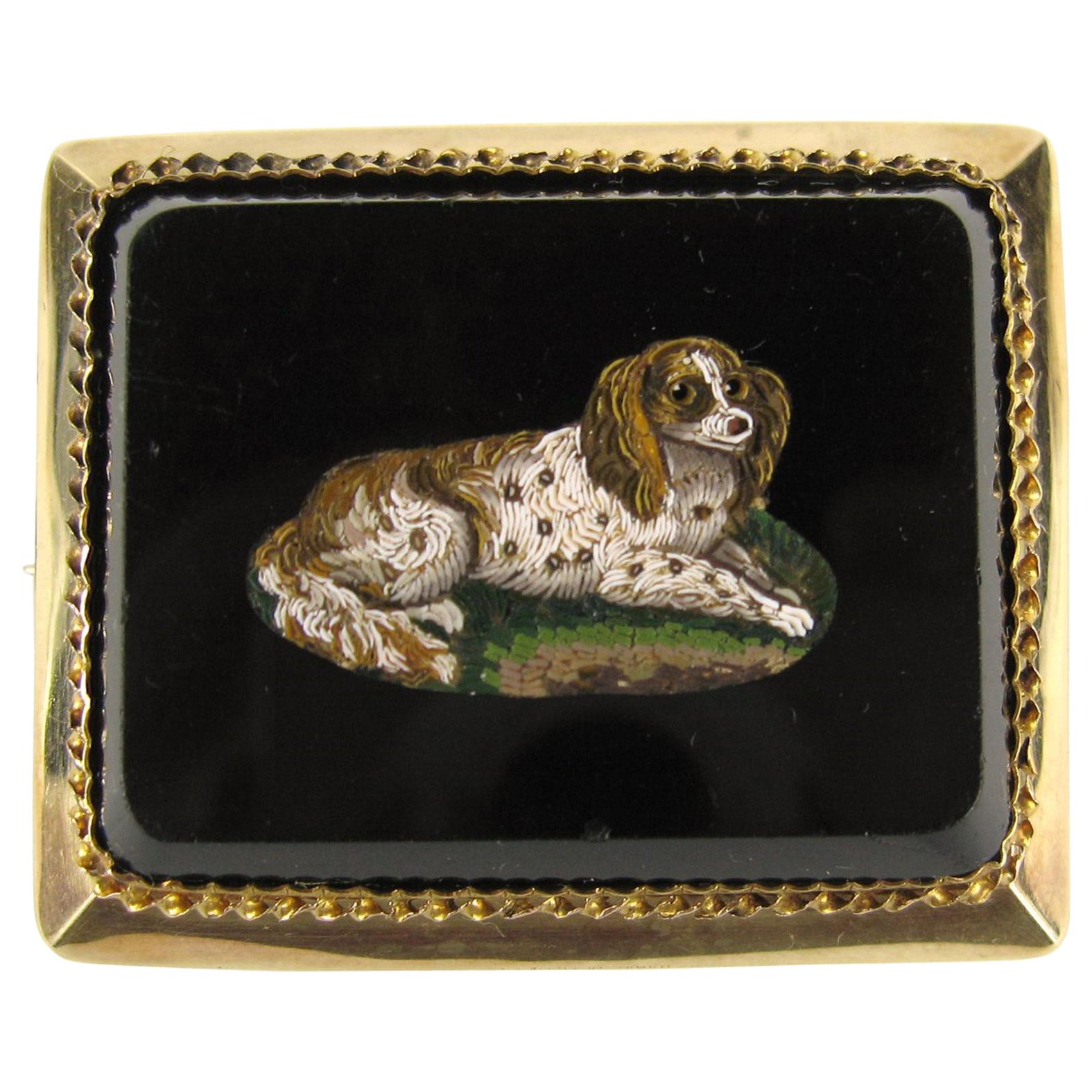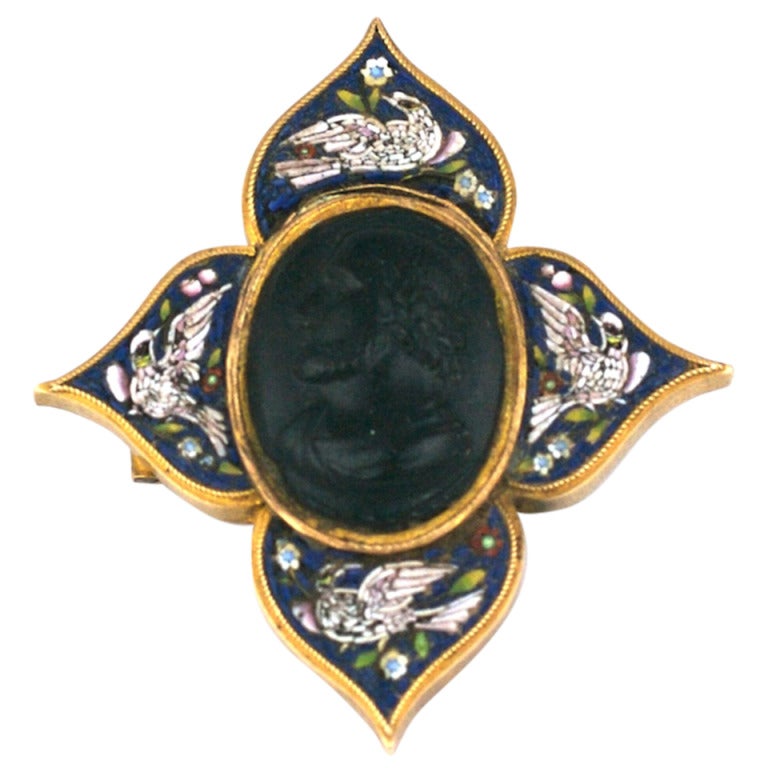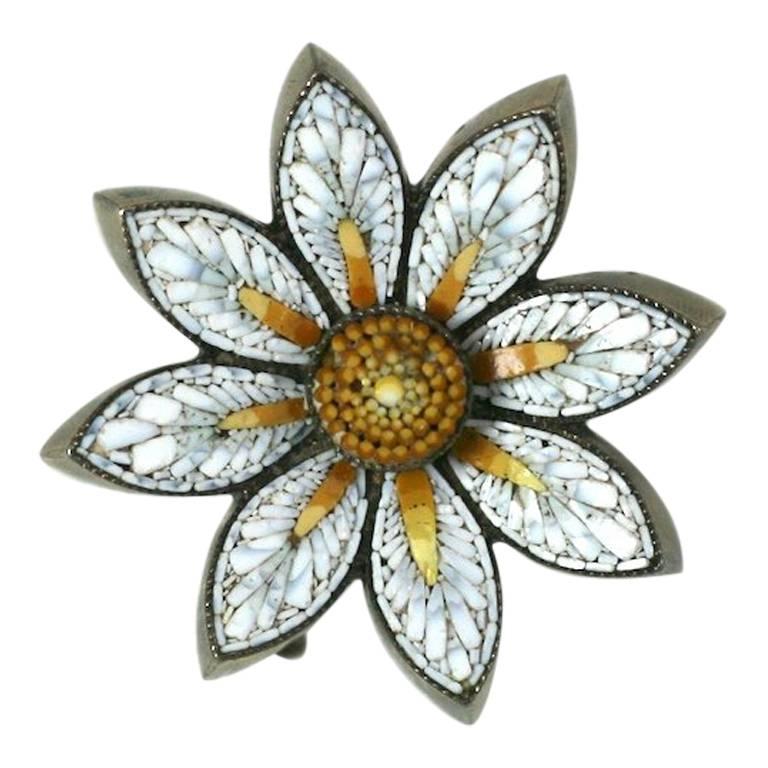Items Similar to Victorian King Charles Spaniel Dog Micromosaic Brooch, circa 1870
Want more images or videos?
Request additional images or videos from the seller
1 of 8
Victorian King Charles Spaniel Dog Micromosaic Brooch, circa 1870
About the Item
Fine quality micromosaic, depicting a King Charles Spaniel dog on his cushion, set as a brooch in 18ct gold.
Dogs were a symbol of faithful love. The King Charles Spaniel breed was extremely popular amongst the English aristocracy, especially during the Victorian period, when Queen Victoria herself doted upon her spaniel, Dash.
Although the Greeks and Romans had used mosaics for many centuries, it was the Italians who developed the art of micromosaics in the Vatican at the end of the 18th century. The Napoleonic expedition to Egypt in 1798 led to a great revival of classical interest and was reflected in the subject matter of the micromosaics, many images came from Roman murals, such as the Doves of Pliny, ancient mosaic floors and newly excavated archaeological sites. Micromosaics became very fashionable pieces at the time.
During the 19th Century wealthy young aristocrats were expected to complete their education with a “Grand Tour” of Europe with Rome, Italy being an essential destination.
Most mosaics were bought in plaque form and many were brought back to be turned into jewellery or put onto furniture as mementos of their journey. The majority brought back “archaeological” pieces depicting The Colosseum, The Forum, The Pantheon etc. However, they also brought back, a limited number with differing subjects such as landscapes, animals, mythology and more symbolic pieces e.g. Doves symbolising love, dogs faithfulness, and flowers which all had their individual symbolisms.
The Micromosaic Technique
Opaque lumps of enamel called Smalti of variegated hues were first baked in a furnace and then teased out into long filaments called Filati.
The mosaicist arranged the thousands of colours as required into a palette like an artist would and broke off the tiny coloured strands (less than 1mm each) as he needed them. They were then placed in position upright into a shallow copper tray that had been lined with a slow drying adhesive medium. The tray was tilted on an easel and the mosaicist copied the painting or design that he was borrowing as a template.
The dimensions are
Width 4.3cm
Height 3.6cm
Depth 0.7cm
Depth inc Brooch Pin 1.3cm
- Metal:18k Gold
- Dimensions:Height: 1.42 in (36 mm)Width: 1.7 in (43 mm)Depth: 0.52 in (13 mm)
- Style:Victorian
- Place of Origin:Italy
- Period:Late 19th Century
- Date of Manufacture:Circa 1870
- Condition:Wear consistent with age and use. Pristine, no loss of tesserae or damage to Micromosaic, very minor surface scratches to crystal unable to see with the naked eye.
- Seller Location:London, GB
- Reference Number:
About the Seller
5.0
Recognized Seller
These prestigious sellers are industry leaders and represent the highest echelon for item quality and design.
Established in 1969
1stDibs seller since 2014
52 sales on 1stDibs
Associations
The British Antique Dealers' AssociationLAPADA - The Association of Arts & Antiques DealersInternational Confederation of Art and Antique Dealers' Associations
- ShippingRetrieving quote...Ships From: London, United Kingdom
- Return PolicyA return for this item may be initiated within 3 days of delivery.
More From This SellerView All
- Victorian Emerald Diamond Pendant or Brooch, circa 1860Located in London, GB18ct gold and silver set Victorian, Diamond and Emerald Pendant or Brooch circa 1860 Floral and scroll motif design in 18ct yellow gold with emerald tips to the flowers with an art...Category
Antique 1860s British Victorian Drop Necklaces
MaterialsDiamond, Emerald, 18k Gold, Silver
- Victorian Reverse Intaglio Essex Crystal Bird BroochLocated in London, GBEssex crystal carved and painted showing a bird upon a cherry tree branch. Set on a mother of pearl background in 18kt gold. Essex Crystal or reverse intaglio...Category
Antique Late 19th Century British Victorian Brooches
Materials18k Gold, Yellow Gold
- Jugenstil Diamond Pendant Brooch, circa 1890Located in London, GBJugenstil Diamond Pendant Brooch, circa 1890 18ct yellow gold and silver set, diamonds. Setting diamonds in silver, “silver set”, was a techni...Category
Antique Late 19th Century Austrian Jugendstil Brooches
MaterialsDiamond, 18k Gold
- Art Nouveau Diamond Opal Pendant/Brooch, circa 1900Located in London, GB18ct gold & silver set Art Nouveau Diamond Opal Pendant/Brooch dated circa 1900 Five round opals with an articulated pear shaped opal drop, very well matched with lively play of colours and iridescence in reds, greens, blues and gold. Set in 18 carat yellow gold claw collets Two main transitional cut (old mine) diamonds 0.70ct. Mix of old mine and rose cut diamonds in an 18 carat yellow gold with “silver Set” channel setting , approx 1 ct total. G/H/I, VS2-SI2. Total diamond weight: approx 1.7carats Setting diamonds in gold with a thin layer of silver, “silver set”, was a technique used in the Georgian/Victorian/Art Nouveau period as white coloured gold and platinum were not yet available. A very thin layer of silver was applied to the gold, on which the diamonds were set, to show them off to their best advantage (as the yellow would reflect and distort the white colour of the diamonds). The Art Nouveau period was a short lived but worldwide movement which reached its peak at the end of the 19th Century and the first decade of the 20th Century. It had its roots in the Pre Raphaelite and Arts and Crafts movements in Britain in the 1860’s. Artists, such as William Morris, took their inspiration from the flora and fauna of nature and rejected the mass industrialisation and mechanisation of the Victorian age. Art Nouveau continued with this theme and has a distinctive appearance with soft, curved shapes and lines and often depicted natural designs such as flowers, birds and the female form. Before the Art Nouveau period, the emphasis had been to design pieces with an emphasis on gem stones, diamonds, rubies emeralds etc. However, during the Art Nouveau period, jewellers adopted the idea of using other semi–precious stones “from nature” such as agate, garnet opal, moonstone, aquamarine and experimented with a wide variety of new techniques e.g. enamelling. The “New Art” style became a worldwide movement encompassing all disciplines of the arts, and world class artists as far afield as Gaudi with his “modernisme” architecture in Spain, Louis Comfort Tiffany in New York with objects, Galle Glass in France and the Liberty & Co Archibald Knox designs in Britain, Jugendstil in Northern Europe and Faberge in Russia. The movement flared brightly but briefly and by 1910 it was already going out of style to be replaced by Art Deco. Detachable 18ct brooch...Category
Antique Early 1900s British Art Nouveau Pendant Necklaces
MaterialsDiamond, White Diamond, Opal, 18k Gold, Yellow Gold, Silver
- Victorian Ruby Diamond Cross, circa 1850Located in London, GBAn 18ct Cross with Rubies and Diamonds circa 1850 Single row of Calibré cut natural colour rubies framing a diamond set foliate central design. Single...Category
Antique Mid-19th Century English Victorian Pendant Necklaces
MaterialsDiamond, Ruby, 18k Gold, Silver
- Yellow Gold Victorian Natural Untreated Sapphire Diamond Bangle circa 1860Located in London, GBSeven natural, untreated blue sapphires in a period, Victorian bangle (bracelet) mounted with white diamonds dating from Circa 1860. 18ct yellow gold bangle set with 7 extremely well matched, natural untreated Sapphires...Category
Antique 1860s British Victorian Bangles
MaterialsDiamond, White Diamond, Sapphire, Blue Sapphire, 18k Gold, Yellow Gold
You May Also Like
- Victorian King Charles Spaniel Dog Micromosaic Brooch, circa 1870Located in London, GBFine quality micromosaic, depicting a King Charles Spaniel dog on his cushion, set as a brooch in 18ct gold. Dogs were a symbol of faithful love. The King Charles Spaniel breed was extremely popular amongst the English aristocracy, especially during the Victorian period, when Queen Victoria herself doted upon her spaniel, Dash. Although the Greeks and Romans had used mosaics for many centuries, it was the Italians who developed the art of micromosaics in the Vatican at the end of the 18th century. The Napoleonic expedition to Egypt in 1798 led to a great revival of classical interest and was reflected in the subject matter of the micromosaics, many images came from Roman murals...Category
Antique Late 19th Century Italian Victorian Brooches
Materials18k Gold
- Victorian Micromosaic 14K Gold Brooch Depicting a King Charles Spaniel c. 1870Located in Goettingen, DEVictorian Micromosaic 14K Gold Brooch Depicting a King Charles Spaniel circa 1870 Delightful micromosaic brooch set in a gold frame. The fine inlaid work of colored glass mosaic on ...Category
Antique Late 19th Century European Victorian Brooches
MaterialsOnyx, Gold, 14k Gold, Yellow Gold
- Cavalier King Charles Spaniel Micromosaic BroochLocated in New Orleans, LAThis charming Victorian-era micromosaic brooch is a wonder of meticulous craftsmanship and intricate design. Depicting a friendly Cavalier King Charles Spaniel...Category
Antique 19th Century Italian Victorian Brooches
Materials18k Gold, Yellow Gold
- Micro Mosaic 15 Karat Gold Pendant Brooch King Charles SpanielLocated in Wallkill, NYWonderful Micro-Mosaic Brooch and Pendant, Depicting a King Charles Spaniel. Does double duty, truly a wonderful piece. Antique C style pin back. Set in 15kt Yellow Gold . Measuring...Category
Antique 1860s Italian Brooches
MaterialsGold, 15k Gold, Yellow Gold
- Victorian Micromosaic Cameo BroochLocated in New York, NYLate 19th Century stone cameo brooch with micromosaic dove details. Unusual to have the combination of the hand carved stone cameo with the micromosia...Category
Antique Late 19th Century Italian Victorian Brooches
Materials14k Gold
- Victorian Micromosaic Daisy BroochLocated in New York, NYVictorian Micromosaic Daisy Brooch from the mid 19th Century. Delicate scale with extremely fine tesserai forming a charming daisy motif. Wonde...Category
Antique 1860s Italian Victorian Brooches
MaterialsVermeil
Recently Viewed
View AllMore Ways To Browse
King Jewlery
King Of Jewelry
English Victorian Jewelry
Jewelry For Less
King Gold Jewelry
Popular Fine Jewelry
Jewelry Essentials
Victorian Italian Jewelry
Mythology Jewelry
18k Dog
18k Gold Dog
Antique Dog Jewelry
King Queen Set
Italian Micromosaic
Italian Micromosaics
Antique Egyptian Jewelry
Egyptian Antique Jewelry
Micromosaic Jewellery
